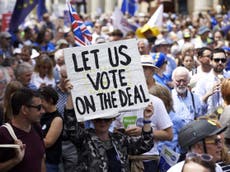May's cynical game over no-deal Brexit sparked an unlikely Commons alliance – and will force her to reveal a Plan B
The prime minister is playing political games, the very charge she throws at Labour. Hers are much more dangerous

After a double revolt by the Commons and the cabinet, Theresa May should now rule out a no-deal Brexit. She won’t, for the time being at least.
The prime minister is playing political games, the very charge she throws at Labour. Hers are much more dangerous. She is cynically keeping “no deal” in play to put pressure on the EU to make concessions and on Tory and Labour MPs ahead of next Tuesday’s vote on her deal. But it’s not working with either audience; Tuesday night’s Commons defeat shows that MPs will do whatever it takes to prevent the UK crashing out of the EU in March.
The Commons voted by 303 to 296 to amend the Finance Bill to restrict the Treasury’s powers to prepare for a no-deal Brexit without a withdrawal agreement and the specific approval of parliament. Twenty Tory MPs rebelled, including senior figures such as Sir Oliver Letwin and Sir Michael Fallon – not the usual pro-EU suspects. Although the government’s defeat will have little practical impact, it is hugely symbolic.
Tory Eurosceptics cling to the legal default position: if there is no agreement, the UK will leave the EU on 29 March. But Tuesday night’s vote suggests that politics will trump the legal position. Hardline Brexiteers try to make “no deal” look respectable but know they are in the minority in the Commons. Boris Johnson argues that leaving on World Trade Organisation terms “is closest to what people actually voted for” in the 2016 referendum.
Strangely, I don’t remember chaos at Dover, and shortages of food and medicines being on the side of the Boris bus.
True, opponents of “no deal” must find a Commons majority for something else if May’s agreement is sunk – such as an extension of the two-year Article 50 process; a Final Say referendum or “Norway Plus”, inside the single market and a customs union. Significantly, some MP wary of a referendum, including Labour’s Ed Miliband and the former Tory cabinet minister Andrew Mitchell, hint they may support one as a last resort.
But the sensibles in the Tory party know the government left serious no-deal preparations very late, and fear there would be disruption. As Amber Rudd, the work and pensions secretary, told the cabinet on Tuesday: “History will take a dim view of a cabinet that presses ahead with no deal. We have to face the world in which we find it, not as we wish it to be, and we have to deal with the facts as we find them.”
David Lidington, May’s de facto deputy and another grown-up, told Radio 4’s Today programme on Wednesday morning that “no deal is not a scenario the government supports”, and could mean tariffs of 90 per cent on some agricultural products and 10 per cent on cars. Yet the government still won’t take it off the table. It’s desperate stuff. The politics of fear. May argues that a no-deal Brexit would be terrible but won’t prevent it. Talk about having your cake and eating it.
Fortunately, MPs in all parties are determined to halt the drift to a no-deal scenario. Some worry that May might even endorse “no deal” as the only way to deliver her repeated promises that the UK will leave on 29 March. I doubt she would be so irresponsible. She would probably extend Article 50 rather than crash out, though she can’t admit that now. But the risk of an accidental cliff-edge departure has rightly persuaded MPs to take matters into their own hands.
The cross-party alliance that won Tuesday night’s vote will remain in business and grow in strength. Once an MP has rebelled on an issue, it’s easier to do it next time. Personal links are being forged across the parties, which is ominous for May.
The rebels’ next target is to force May to respond within three days if, as looks inevitable, the Commons rejects her deal next Tuesday. Originally, she would have had 21 days, allowing her to run down the clock towards exit day and maximise pressure on MPs to back her unwanted deal. So events could move very quickly next week.
If the cross-party move succeeds, Jeremy Corbyn would have to get his skates on, and table a motion of no confidence in the government immediately after May’s expected defeat. The EU would have to produce any last-minute further concessions quickly if it wants to help May in any early second vote on her deal. (An exchange of letters between the EU and UK, confirming the Irish backstop would be temporary, is likely just before Tuesday’s vote).
May acknowledged to the cabinet she would need to “move quickly” after a defeat next week, but refuses to discuss her Plan B, to the frustration of her ministers. When they outline theirs, she listens but doesn’t engage. Sooner rather than later, she is going to need one. The national interest now lies not in ramming through her unloved deal at any cost, but starting to seek consensus on a Plan B that will steer the country away from the cliff edge.






Join our commenting forum
Join thought-provoking conversations, follow other Independent readers and see their replies